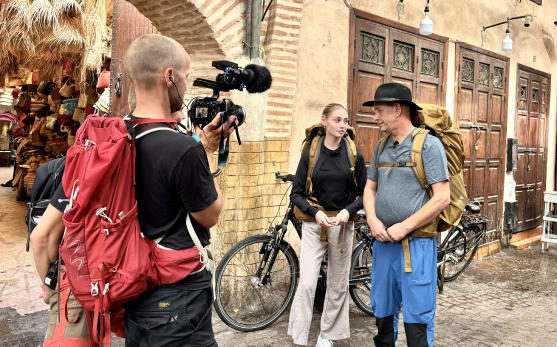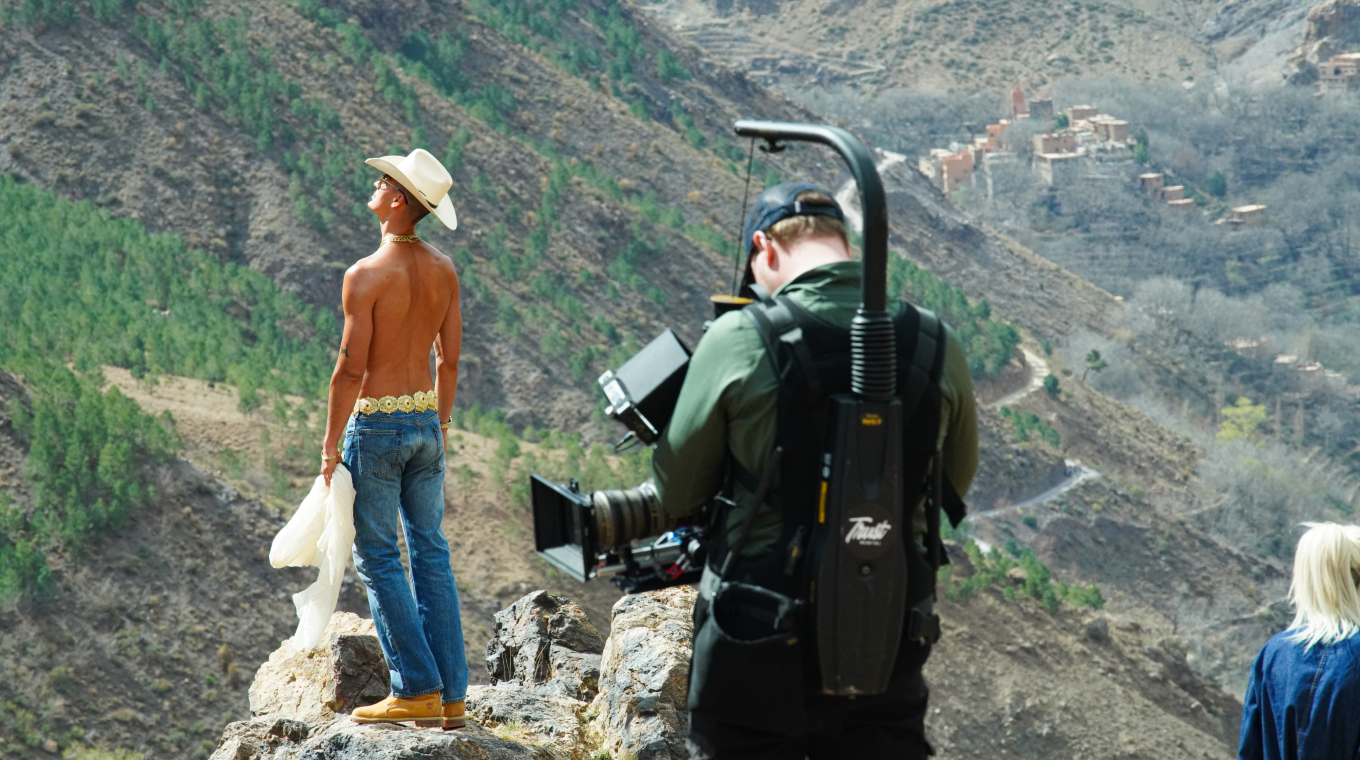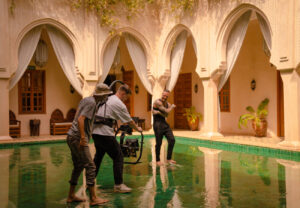Qui a besoin d’un visa de travail ?
Qui a besoin d’un visa de travail ?
Si vous venez au Maroc pour occuper un emploi au sein d’une société marocaine, vous devez généralement obtenir une autorisation de travail délivrée par le Ministère du Travail. Celle-ci prend la forme d’un visa portant la mention “autorisation de travail” apposée sur votre contrat de travail, conformément à l’article 516 du Code du travail. Cette autorisation est distincte de tout visa d’entrée qui peut également être exigé pour accéder au territoire.
Pour les productions de courte durée — cinéma, télévision, publicités, contenus de marque et de nombreux shootings photo — le Maroc applique une procédure différente. Dans ces cas, la plupart des techniciens étrangers travaillent sous couvert d’une autorisation de tournage délivrée par le CCM, via une société de production exécutive locale agréée. En pratique, cette autorisation remplace l’obligation d’un visa de travail individuel, mais uniquement pour la durée et le périmètre du tournage autorisé, et à condition que tous les membres de l’équipe soient correctement inscrits sur l’autorisation. Conditions d’entrée (passeport / visa / e-visa) restent applicables, tout comme les quotas d’équipes locales et les autres réglementations liées à l’industrie.
Un guide pratique ci-dessous vous aidera à organiser votre projet en toute efficacité.
1. Quand vous avez besoin d’un visa ou d’une autorisation de travail
Vous aurez (probablement) besoin d’une autorisation complète de travail si vous êtes :
- En prenant un poste salarié au Maroc (par ex. être embauché par une société de production marocaine au-delà d’une période de tournage spécifique).
- Séjour de longue durée et perception d’un salaire au titre d’un contrat de travail marocain.
- Travaillant temporairement pour une entité marocaine en dehors du cadre d’un tournage spécifiquement autorisé.
Dans ces cas, l’employeur doit obtenir une autorisation (le “visa” apposé sur le contrat de travail) et, dans la plupart des situations, obtenir — ou être dispensé — de l’attestation ANAPEC relative au marché de l’emploi.
2. La voie cinéma & photo : travailler sans autorisation de travail
Pour les productions étrangères, le Centre Cinématographique Marocain (CCM) délivre des autorisations de tournage couvrant les longs-métrages, les séries télévisées, les documentaires, les publicités, les films institutionnels et les clips musicaux. Les délais de traitement varient selon le type de production. Tous les membres étrangers de l’équipe doivent être nommés sur l’autorisation, et la production est tenue de collaborer avec une société de services marocaine agréée.
Ce que cela signifie pour vous :
Si vous êtes un membre d’équipe étranger engagé pour un tournage limité dans le temps et couvert par une autorisation de tournage du CCM, le Maroc n’exige généralement pas d’autorisation de travail individuelle distincte. Votre base légale pour travailler est liée à l’ autorisationet non à un contrat de travail avec un employeur marocain. (Vous devez toutefois respecter les conditions d’entrée : passeport et/ou visa.)
Exigences supplémentaires du CCM à prendre en compte :
- Vous devez être inscrit sur la liste de l’équipe déposée auprès du CCM.
- La production doit respecter le quota d’équipe locale (voir section suivante).
- Les directeur de production doit être marocain et titulaire d’une carte professionnelle (PIC).
- Les productions doivent également enregistrer les stagiaires selon un ratio défini (voir ci-dessous).
3. Quota d’équipe locale
Le Maroc exige que les tournages étrangers incluent un quota minimal de techniciens marocains au sein de l’équipe. Le CCM fixe ce quota à au moins 25 % de techniciens marocains (référencé à la Loi 20-99 et les circulaires du CCM). Les productions doivent soumettre les listes des techniciens étrangers et marocains (avec leurs numéros de carte professionnelle). et respecter le ratio de stagiaires d'un stagiaire pour chaque groupe de 8 techniciens titulaires d’une carte professionnelle..
En pratique, les productions devraient prévoir d’engager des chefs de département et des techniciens marocains, et d’allouer un budget pour les stagiaires. Le système de quotas s’applique dans plusieurs cas et est activement vérifié lors de l’étape d’autorisation. Pour la plupart des productions, l’intégration d’une partie de l’équipe locale doit être considérée comme un avantage, car cette approche est généralement plus rentable que de faire venir une équipe complète de l’étranger. Ces quotas sont conçus pour protéger et renforcer la main-d’œuvre locale et ont des fondements éthiques pour leur existence.
4. Visas d’entrée vs. droit au travail
Même lorsque vous n’avez pas besoin d’une autorisation de travail personnelle (parce qu’une autorisation de tournage du CCM vous couvre), vous devez tout de même entrer légalement au Maroc:
- De nombreuses nationalités (par ex. UE, Royaume-Uni, États-Unis) peuvent entrer sans visa pour une durée allant jusqu’à 90 jours pour le tourisme ou les affaires ; les productions s’appuient souvent sur ce dispositif pour des tournages courts, associé à l’autorisation du CCM pour travailler légalement sur le plateau. Vérifiez toujours la validité de votre passeport.
- Le portail officiel Accès Maroc centralise les informations relatives aux visas et eVisas, et constitue la référence pour vérifier les règles d’entrée en vigueur et savoir si vous avez besoin d’un AEVM/e-visa avant de voyager.
Astuce : Votre société de production locale vous indiquera quels membres de l’équipe doivent obtenir un visa avant le voyage et lesquels peuvent entrer sans visa.
5. Checklist rapide pour les producteurs
- Faire appel à une société marocaine de services de production accréditée par le CCM, dès les premières étapes.
- Confirmer le statut d’entrée pour chaque voyageur (exemption de visa vs. e-visa) et la validité du passeport (minimum six mois à la date d’entrée).
- Déposer l’autorisation CCM avec les listes complètes avec les listes complètes, en respectant :
- ≥ 25 % de techniciens marocains,
- 1 stagiaire pour 8 techniciens titulaires d’une carte professionnelle
- Directeur de production marocain (titulaire d’une carte professionnelle).
- Ne pas mettre des personnes au travail si elles sont pas inscrites sur l’autorisation de tournage.
- Si vous embauchez quelqu’un à long terme au Maroc (en dehors du tournage), basculez vers la procédure d’autorisation de travail conformément à l’article 516.
Ce qui s’applique dans la plupart des cas
- L’autorisation de tournage du CCM est généralement suffisante pour des tournages à court terme (cinéma, télévision, photo) réalisés par des équipes étrangères —mais vous devez respecter les quotas d’équipe locale et être correctement inscrit sur l’autorisation de tournage.
- Visas d’entrée: question distincte — vérifiez si votre passeport est exempté de visa ou nécessite un e-visa avant de prendre l’avion.
Pour plus d’informations sur l’obtention d’un visa de travail ou pour discuter de votre projet à venir, contactez-nous dès aujourd'hui.










